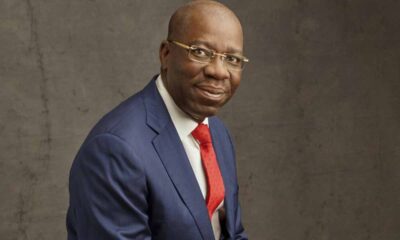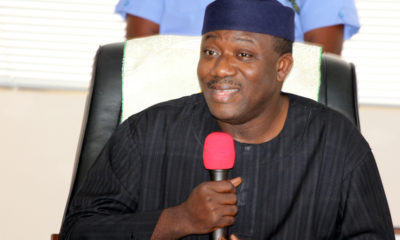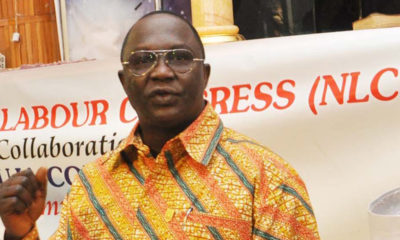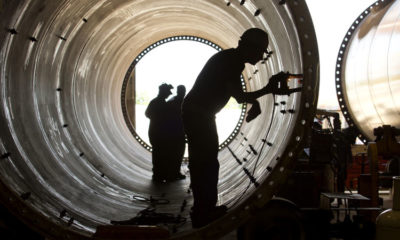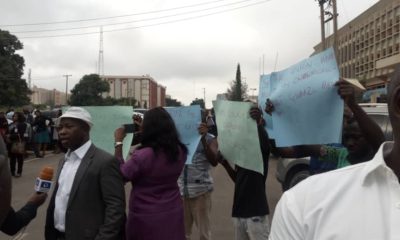- Minimum Wage: Workers Lobby Senators to Approve N30,000
Workers at the National Assembly, under the auspices of the Parliamentary Staff Association of Nigeria, are lobbying members of the Senate especially those handling the New Minimum Wage Bill to approve N30,000 as passed by the House of Representatives.
Chairman of PASAN, National Assembly chapter, Mr Bature Muhammad, made this known in a chat with one of our correspondents on Monday, ahead of the senators’ resumption next week.
Media had reported last week Sunday that the resolution of the dispute over the national minimum wage was far from being over, following the decision by the House to pass N30,000 as the new wage.
The lower chamber of the National Assembly had on Wednesday passed the N30,000, an amount higher by N3,000 than the N27,000 which President Muhammadu Buhari presented to the National Assembly earlier in the executive bill.
However, the N30,000 tallied with the recommendation by the tripartite committee set up by the President on the minimum wage, which submitted its report in November, 2018.
But following a meeting of the National Council of State last month, the President eventually presented a minimum wage bill of N27,000 to the National Assembly.
The PASAN chairman informed our correspondent that the workers had been engaging with senators to see that they concur with the representatives on N30,000.
He said, “We have already started going underground to lobby the various committees and senators on that issue. Because of the election, not all of them are around but the few of them that are around, we have been able to talk to them; and those we are close to, we have called them on the phone. And they assured (us) that they don’t have a problem with that (N30,000).”
Muhammad recalled that the Council of State approved N30,000 for Federal Government workers and N27,000 for state workers, but the President went on to seek legislative approval for a N27,000 flat wage.
“When it gets to the harmonisation stage, they will agree to that N30,000. The tripartite committee agreed on N30,000 but because it was tabled before the Council of State; and reliably, what was said after the meeting that the Council of State approved N30,000 for Federal Government workers and N27,000 for state workers. But when they transmitted the bill to the National Assembly, they said it was N27,000. That was what brought the labour to start raising sentiments. But I believe they will all agree on N30,000.”
After the House passed the bill, the Speaker, Mr Yakubu Dogara, had noted that should the Senate refused to approve N30,000, a conference committee would be set up to harmonise the different resolutions by the chambers and make its recommendation.
Senate panel members divided over minimum wage
Meanwhile, members of the Senate ad-hoc Committee saddled with the responsibility of working on the minimum wage (amendments) bill have expressed divergent views on the actual amount the panel would recommend as the least amount that the Nigerian workers could earn per month.
Investigations by one of our correspondents revealed that some of the panel members are pushing for concurrence with the N30, 000 minimum wage approved and passed by the House of Representatives last week.
Other members of the panel told our correspondent on condition of anonymity that they were comfortable with the N27, 000 minimum wage proposed by the President while a member vowed to push for a higher wage.
The Deputy Senate President, Ike Ekweremadu, had penultimate week ago, announced the Chief Whip of the Senate, Senator Olusola Adeyeye, as the chairman of the eight-member panel and they were asked to make their report available within two weeks.
Other members of the panel are Senator Abu Ibrahim, who will represent the Senate Committee on Labour; Senator Shehu Sani, representing the North-West and Senator Sam Egwu, representing the South-East.
The rest are Senators Suleiman Adokwe (North-Central), Francis Alimikhena (South-South), Solomon Adeola (South-West), and Binta Garba.
A member of the panel said, “Where is the money to pay N30, 000? Many state governments are finding it difficult to pay the current N18, 000 not to talk of N27, 000 that the President has proposed.
“I am of the view that we should retain the N27, 000 proposal as it is to avoid sacking of workers both at the private and public establishments.”
But a member told our correspondent on condition of anonymity that it would be risky for the panel to recommend a lesser amount because of the consideration that state governors would not be able to pay.
He said, “I don’t think that state governors cannot pay N30, 000 as minimum wage. They should prioritise their expenditure and reduce waste. The naira has been devalued and it had affected its purchasing powers.”
Another member, who subscribed to a lesser wage than N30, 000 said, “When the minimum wage was catapulted from N11, 000 to N18, 000, about 27 states in Nigeria could not pay salaries for many months.
“When President Muhammadu Buhari took over power, part of the problems he faced was how to rescue the states from collapse because they could no longer pay salaries.
“The only way the government could pay N30, 000 as minimum wage is to further devalue the naira. It would print more naira and pump into the system but what would the workers be able to buy with that?
“We should treat this issue with maturity in the Senate so that we don’t create problems for the incoming government.”
The panel chairman, in an interview with our correspondent last week, refused to confirm whether his panel would also jack up the minimum wage to N30, 000 like their counterparts in the House of Representatives.
The chairman said he would be unfair to his other colleagues if he declared that the panel would also recommend a higher wage than the N27, 000 presented to the National Assembly by President Buhari.

 Billionaire Watch3 weeks ago
Billionaire Watch3 weeks ago
 Startups4 weeks ago
Startups4 weeks ago
 News4 weeks ago
News4 weeks ago
 News4 weeks ago
News4 weeks ago
 Bitcoin4 weeks ago
Bitcoin4 weeks ago
 Naira4 weeks ago
Naira4 weeks ago
 Forex3 weeks ago
Forex3 weeks ago
 Treasury Bills4 weeks ago
Treasury Bills4 weeks ago


